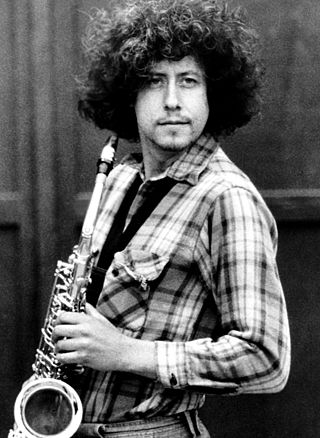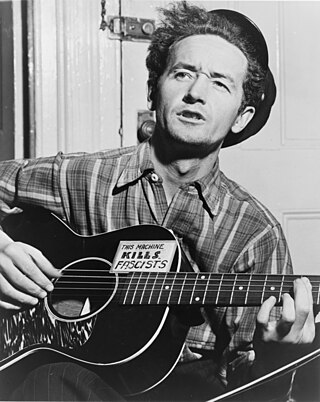
Arlo Davy Guthrie is an American folk singer-songwriter. He is known for singing songs of protest against social injustice, and storytelling while performing songs, following the tradition of his father, Woody Guthrie. Guthrie's best-known work is his debut piece, "Alice's Restaurant Massacree", a satirical talking blues song about 18 minutes in length that has since become a Thanksgiving anthem. His only top-40 hit was a cover of Steve Goodman's "City of New Orleans". His song "Massachusetts" was named the official folk song of the state, in which he has lived most of his adult life. Guthrie has also made several acting appearances. He is the father of four children, who have also had careers as musicians.

Woodrow Wilson Guthrie was an American singer-songwriter and composer who was one of the most significant figures in American folk music. His work focused on themes of American socialism and anti-fascism. He inspired several generations both politically and musically with songs such as "This Land Is Your Land".
Industrial folk music, industrial folk song, industrial work song or working song is a subgenre of folk or traditional music that developed from the 18th century, particularly in Britain and North America, with songs dealing with the lives and experiences of industrial workers. The origins of industrial folk song are in the British Industrial Revolution of the eighteenth century as workers tended to take the forms of music with which they were familiar, including ballads and agricultural work songs, and adapt them to their new experiences and circumstances. They also developed in France and the US as these countries began to industrialise.
Alan Jabbour was an American musician and folklorist, and the founding director of the American Folklife Center at the Library of Congress.

Gilbert Vandine "Cisco" Houston was an American folk singer and songwriter, who is closely associated with Woody Guthrie due to their extensive history of recording together.
Folk punk is a fusion of folk music and punk rock. It was popularized in the early 1980s by The Pogues in England, and by Violent Femmes in the United States. Folk punk achieved some mainstream success in that decade. In more recent years, its subgenres Celtic punk and Gypsy punk have experienced some commercial success.

Ellis Paul is an American singer-songwriter and folk musician. Born in Presque Isle, Aroostook County, Maine, Paul is a key figure in what has become known as the Boston school of songwriting, a literate, provocative, and urbanely romantic folk-pop style that helped ignite the folk revival of the 1990s. His pop music songs have appeared in movies and on television, bridging the gap between the modern folk sound and the populist traditions of Woody Guthrie and Pete Seeger.
Smithsonian Folkways is the nonprofit record label of the Smithsonian Institution. It is a part of the Smithsonian's Smithsonian Center for Folklife and Cultural Heritage, located at Capital Gallery in downtown Washington, D.C. The label was founded in 1987 after the family of Moses Asch, founder of Folkways Records, donated the entire Folkways Records label to the Smithsonian. The donation was made on the condition that the Institution continue Asch's policy that each of the more than 2,000 albums of Folkways Records remain in print forever, regardless of sales. Since then, the label has expanded on Asch's vision of documenting the sounds of the world, adding six other record labels to the collection, as well as releasing over 300 new recordings. Some well-known artists have contributed to the Smithsonian Folkways collection, including Pete Seeger, Ella Jenkins, Woody Guthrie, and Lead Belly. Famous songs include "This Land Is Your Land", "Goodnight, Irene", and "Midnight Special". Due to the unique nature of its recordings, which include an extensive collection of traditional American music, children's music, and international music, Smithsonian Folkways has become an important collection to the musical community, especially to ethnomusicologists, who utilize the recordings of "people's music" from all over the world.

The American folk music revival began during the 1940s and peaked in popularity in the mid-1960s. Its roots went earlier, and performers like Josh White, Burl Ives, Woody Guthrie, Lead Belly, Big Bill Broonzy, Richard Dyer-Bennet, Oscar Brand, Jean Ritchie, John Jacob Niles, Susan Reed, Paul Robeson, Bessie Smith, Ma Rainey and Cisco Houston had enjoyed a limited general popularity in the 1930s and 1940s. The revival brought forward styles of American folk music that had in earlier times contributed to the development of country and western, blues, jazz, and rock and roll music.

Archie Green was an American folklorist specializing in laborlore and American folk music. Devoted to understanding vernacular culture, he gathered and commented upon the speech, stories, songs, emblems, rituals, art, artifacts, memorials, and landmarks which constitute laborlore. He is credited with winning Congressional support for passage of the American Folklife Preservation Act of 1976, which established the American Folklife Center in the Library of Congress.

Joel Rafael is an American singer-songwriter and folk musician from San Diego County, California. Rafael's second volume to celebrate the songs of Woody Guthrie, was released on Appleseed in 2005. The first volume, Woodeye, was released on Inside Recordings in 2003. Joel and his acoustic band have been performing and touring nationally since 1993. In 2000, the Joel Rafael Band, comprising Joel Rafael,, his daughter Jamaica, Carl Johnson and Jeff Berkley (ethno-percussion), released their third album, Hopper on Inside Recordings, an independent label created by Jackson Browne and his management. The album was nominated in 2001 for an Association For Independent Music (AFIM) Best Contemporary Folk award.

Contemporary folk music refers to a wide variety of genres that emerged in the mid-20th century and afterwards which were associated with traditional folk music. Starting in the mid-20th century, a new form of popular folk music evolved from traditional folk music. This process and period is called the (second) folk revival and reached a zenith in the 1960s. The most common name for this new form of music is also "folk music", but is often called "contemporary folk music" or "folk revival music" to make the distinction. The transition was somewhat centered in the United States and is also called the American folk music revival. Fusion genres such as folk rock and others also evolved within this phenomenon. While contemporary folk music is a genre generally distinct from traditional folk music, it often shares the same English name, performers and venues as traditional folk music; even individual songs may be a blend of the two.

Frank Hamilton is an American folk musician, collector of folk songs, and educator. He co-founded the Old Town School of Folk Music in Chicago, Illinois in 1957. As a performer, he has recorded for several labels, including Folkways Records. He was a member of the folk group The Weavers in the early 1960s, and appeared at the first Newport Folk Festival in 1959. He was the house musician – playing guitar and other folk instruments – for Chicago's Gate of Horn, the nation's first folk music nightclub. After many years of teaching, playing, and singing in California he married a third time, and with his wife relocated to Atlanta, where he performs on banjo, guitar, ukulele, voice, and other instruments and co-founded the Frank Hamilton School in 2015.
The Kossoy Sisters are identical twin sisters who performed American folk and old-time music. Irene sang mezzo-soprano vocal, and Ellen supplied soprano harmony, with Irene on guitar and Ellen playing the five-string banjo in a traditional up-picking technique. Their performances were notable examples of close harmony singing. They began performing professionally in their mid-teens and are esteemed as a significant part of the popular folk music movement that started in the mid-1950s.
People's Songs was an organization founded by Pete Seeger, Alan Lomax, Lee Hays, and others on December 31, 1945, in New York City, to "create, promote, and distribute songs of labor and the American people." The organization published a quarterly Bulletin from 1946 through 1950, featuring stories, songs and writings of People's singers members. People's Songs Bulletin served as a template for folk music magazines to come like Sing Out! and Broadside.
Harriet Elizabeth "Hally" Wood was an American musician, singer and folk musicologist. She worked with John and Alan Lomax and participated in the publication of songbooks for the works of artists like Lead Belly and Woody Guthrie. She also performed as a singer and recorded solo and collaborative albums with folk singers such as Pete Seeger.

Don Conoscenti is an American singer-songwriter, record producer, and multi-instrumentalist originally from Chicago, Illinois. He started his musical career in middle school playing drums, before receiving a guitar as a gift from a cousin for his 8th grade graduation. Conoscenti became known for his unique use of multiple and partial capos on the acoustic guitar, releasing an instructional video Capo Abuse and Guitar Techniques in 2001. He has played with many notable musicians, including Kristian Bush, David Wilcox, Ellis Paul, John Mayer, Nils Lofgren, Robert Mirabal, Bill Miller (musician), and The Indigo Girls, and he produced Dave Nachmanoff.

"Pittsburgh Town", sometimes titled as "Pittsburgh" or "Pittsburgh is a Great Old Town", is a folk song written by Woody Guthrie and originally recorded by Pete Seeger. The song was written during a Pittsburgh, Pennsylvania stop on an Almanac Singers' tour; both Seeger and Guthrie were members of the band at this time. The song speaks of the labor and environmental problems that the city was facing in 1941, when the song was written. In the time since, environmental legislation has reduced the pollution problem that plagued Pittsburgh; because of this, the song's mentions of pollution in Pittsburgh have been sometimes been replaced with verses extolling the city.
Judith McCulloh was an American folklorist, ethnomusicologist, and university press editor.











